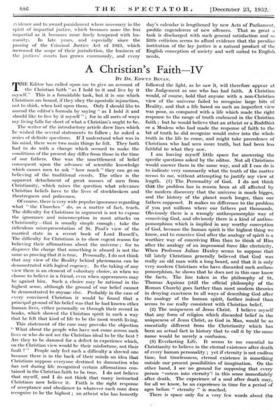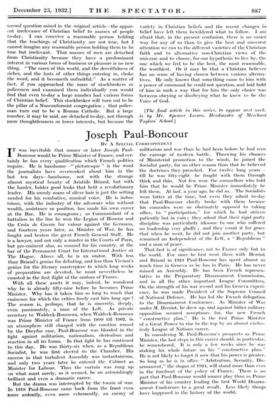A Christian's Faith—IV
BY DR. EDNVYN BEVAN.
THE Editor has called upon me to give an account of the Christian faith "as I hold to it and live by it myself." This is a formidable task, but it is one which Christians arc bound, if they obey the apostolic injunction, not to shirk, when laid upon them. Only I should like to amend the editor's formula by saying "as I hold it and should like to live by it myself " ; for in all sorts of -ways my living falls far short of what a Christian's ought to be.
The writer of the introductory article drew lines which lie wished the several statements to follow ; he asked a series of definite questions. If I understand what was in his mind, there were two main things he felt. They both had to do with a change which seemed to make the conditions of the present day differ from those in the time of our fathers. One was the unsettlement of belief consequent upon the advance of scientific knowledge which causes men to ask "how much" they can go on believing of the traditional creeds. The other is the apparent detachment of great masses of men from Christianity, which raises the question what relevance Christian beliefs have to the lives of stockbrokers and theatregoers and policemen.
Of course, there is very wide popular ignorance regarding what "the Churches" do, as a matter of fact, teach. The difficulty for Christians in argument is not to expose the ignorance and misconception in most attacks on Christianity—that is usually simple enough ; take the ridiculous misrepresentation of St. Paul's view of the married state in a recent book of Lord Russell's. The difficulty for Christians is to show cogent reason for believing their affirmations about the universe ; for to disprove the charge that something is absurd is not the same as proving that it is true. Personally, I do not think that any view of the Reality behind phenomena can be demonstrated with logical cogency. In the taking of any view there is an clement of voluntary choice, as when we choose to believe in a friend, even when appearances may be against him. Such a choice may be rational in the highest sense, although the ground of our belief cannot be demonstrated to anyone else. Probably in the case of every convinced Christian it would be found that a principal ground of his belief was that he had known other human lives, either personally or through their record in books, which showed the Christian spirit in such a way that he felt that kind of life to be the most worth living.
This statement of the case may provoke the objection "What about the people who have not come across such lives or who do not see the Christian ideal to be the best ? Are they to be damned for a defect in experience which, on the Christian view would be their misfortune, not their fault ? " People only feel such a difficulty a shrewd_ one because there is in the back of their minds an idea that Christians suppose everyone destined to damnation who has not during life recognized -certain affirmations con- tained in the Christian faith to be true. I do not believe that myself, and I do not think that many instructed Christians now believe it. Faith is the right response of acceptance and obedience to whatever each man does recognize to be the highest, an atheist who has honestly followed the light, as he saw it, will therefore appear at the Judgement as one who has had faith. A Christian would, of course, hold that anyone with a non-Christian view of the universe failed to recognize large bits of Reality, and that a life based on such an imperfect view was poor, as compared with a life which made the right response to the range of truth embraced in the Christian faith ; but he would believe that an atheist or a Buddhist or a Moslem who had made the response of faith to the bit of truth he did recognize would enter into the whole truth in the life to come, and might take precedence of Christians who had seen more truth, but had been less faithful to what they saw.
I am leaving myself little space for answering the specific questions asked by the editor. Not all Christians would answer them in the same way, and all I can do is to indicate very summarily what the truth of the matter seems to me, without attempting to justify my view at length. (1) The Personality of God. I do not think 04 the problem has in reason been at all affected by the modern discovery that the universe is much bigger, and the history of the planet much longer, than our fathers supposed. It makes no difference to the problem if you put millions where our fathers put thousands. Obviously there is a wrongly anthropomorphic way of conceiving God, and obviously there is a kind of anthro- pomorphism which is implied in any worthy conception of God, because the human spirit is the highest thing we know, and to conceive God after the analogy of spirit is a worthier way of conceiving Him than to think of Him after the analogy of an impersonal force like electricity. When Professor Julian Huxley seems to suppose that till lately Christians generally believed that God was really an old man with a long beard, and that it is only very modern Christians who have discarded such anthro- pomorphism, he shows that he does not in this case know the facts. The line taken in the philosophy of St. Thomas Aquinas (still the official philosophy of the Roman Church) goes farther than most modem theories in denying exactness to all ways of describing God after the analogy of the human spirit, farther indeed than seems to me really consistent with Christian belief.
(2) The uniqueness of Jesus Christ. I believe myself that any form of religion which discarded belief in the uniqueness of Jesus Christ, as God in Man, would be so essentially different from the Christianity which has been an actual fact in history that to call it by the same name would be merely a confusion.
(3) Everlasting Life. It seems to me essential to Christianity to believe in the eternal existence after death of every human personality ; yet if eternity is not endless time, but timelessness, eternal existence is something outside our present possibilities of imagination. On the other hand, I see no ground for supposing that every person "enters into eternity'! in this sense immediately . after death. The experience of a soul after death may, for all we know, be an experience in time for a period of ages before " eternity " is reached. , There is space only for a very _few words about the second question raised in the original article—the appar- ent irrelevance of Christian belief to masses of people to-day. I can conceive a reasonable person holding that the teachings of Christianity are not true, but I cannot imagine any reasonable person holding them to be true but irrelevant. That masses of men are detached from Christianity because they have a predominant interest in various forms of business or pleasure is no new thing. "The cares of this world, and the deceitfulness of riches, and the lusts of other things entering in, choke the word, and it becometh unfruitful." As a matter of fact, if you approached the mass of stockbrokers or policemen and examined them individually you would find that even to-day a large number had various forms of Christian belief. This stockbroker will turn out to be the pillar of a Nonconformist congregation ; that police- man turn out to be a Roman Catholic. But a large number, it may be said, are detached to-day, not through mere thoughtlessness or lower interests, but because the variety in Christian beliefs and the recent changes in belief have left them bewildered what to follow. I am afraid that, in the present confusion, there is no easier way for any of us than to give the best and sincerest attention we can to the different varieties of the Christian faith and to alternative non-Christian views of the universe and to choose, for our hypothesis to live by, the one which we feel to be the best, the most reasonable, the worthiest. Or it may be that a Christian believer has no sense of having chosen between various alterna- tives. He only knows that something came to him with a power of command he could not question, and laid hold of him in such a way that for him the only choice was between obeying or disobeying what he knew to be the Voice of God.
The ,fined article in this series, to appear next week. is by Mr. Spencer Leeson, Headmaster of Merchant Taylors' School.]



























 Previous page
Previous page